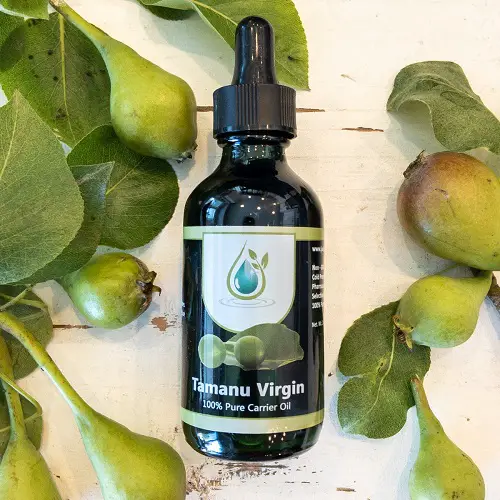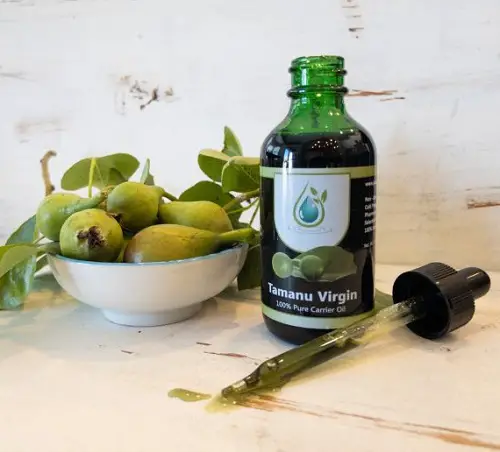If you have been an EO lover for a while but have never heard of it, you surely are missing out on the great benefits of Tamanu oil!

Extracted from the nuts of the Calophyllum inophyllum plant, sometimes called the oil nut, mastwood, laurelwood, or beauty leaf, Tamanu oil has been traditionally used for hair—and skin-related conditions. Let’s look into more of tamanu oil’s benefits.
Benefits of Tamanu Oil
1) Protects against free radical damage and reduces aging symptoms
The powerful antioxidant properties of Tamanu oil make it an excellent option for fighting oxidative stress and free radicals in the body.
Free radicals are those compounds that cause oxidative stress in the body, ultimately causing cellular damage and aging symptoms. Thus, you may often find tamanu oil as an active ingredient in anti-aging creams.
2) Provides sun protection
Following up on the first point, one of the main causes of oxidative stress in the skin and body is harmful UVB radiation from the sun, which causes excess free radicals.
Research has shown that Tamandu oil can absorb a certain level of UV light, thus helping prevent sun damage. Because Tamanu oil helps protect against the sun and has antioxidant properties, it is an essential oil that you must incorporate into your daily skincare routine alongside sunscreen to reap double the benefits!
3) Has antimicrobial and antibacterial properties
Tamanu oil has antimicrobial, antibacterial, and antifungal properties, which help it fight acne-causing germs on the skin. A 2021 article suggests that tamanu oil might help inhibit the growth of certain acne-causing bacteria, such as Propionibacterium acnes, Propionibacterium granulosum, and Staphylococcus epidermidis. Tamanu oil is even suggested to have stronger antifungal effects than fluconazole, a prescription antifungal drug.
An in vitro study found that Tamanu oil has high antibacterial activity. It helps inhibit the growth of bacteria that cause skin infections, namely erythrasma. It was also found to fight various staph infections.
4) Helpful in Treating Eczema
According to a 2021 study, tamanu oil may help treat eczema. Its presence of calophyllolide, a powerful anti-inflammatory molecule, can help remedy skin disorders like eczema, psoriasis, and rosacea.
Tamanu oil’s antimicrobial properties aid in repairing the skin barrier, which is generally affected the most in conditions like eczema. Besides, oxidative stress, which in turn causes inflammation, can be a leading cause and effect of eczema. Tamanu oil’s antioxidant properties also aid in relieving eczema symptoms.
5) Helps in Wound Healing
A 2018 review concluded that tamanu oil can effectively promote wound healing, especially healing keratinocytes, the cells in the skin’s outer layer. Moreover, it can also help heal fibroblast cells, which form part of the skin’s connective tissue.
One study even suggested that tamanu oil facilitated better healing than vitamin C. Researchers also say that the oil’s anti-inflammatory properties make it a great option for wound healing.
6) Enhances Collagen Protection
Tamanu oil enhances collagen production by promoting the production of glycosaminoglycans (GAGs)—polysaccharides that help create collagen and elastin. These compounds are responsible for skin and tissue health, maintaining their firmness and elasticity.
Enhanced collagen production, in turn, helps in wound healing too. Thus, tamanu oil can also help reduce scarring.
Caution Before Using Tamanu Oil
Before using any essential oil, you must be aware of certain things; the same applies to tamanu oil. Here are some words of caution before you start using tamanu oil.
- Since tamanu oil is extracted from the seeds of the tamanu tree, which is classified as a nut tree, you should not use this oil if you are allergic to nuts.
- While tamanu oil can be used topically after proper dilution with carrier oil, it is toxic and must not be ingested.
- Before using this oil regularly, always conduct a proper patch test with diluted tamanu oil and wait for at least 24 hours to see if there is any skin irritation or adverse reactions.
- If you are unsure of whether to use this essential oil on your skin, consult a dermatologist.



